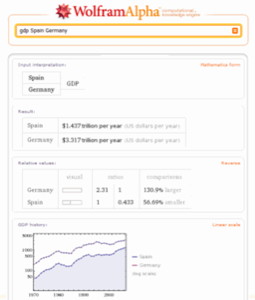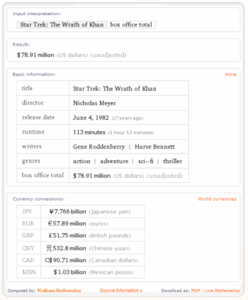Wolfram Alpha, the hyped “Google killer” will officially launch on May 18, but we already got preview access to it today, and had a chance to put it through its paces.

Let’s get this out of the way quickly: Wolfram Alpha is not (yet?) geared towards mainstream Internet users, who, for the most part, are still better served by Google. Of course, comparing Alpha to Google isn’t even fair, but most users will treat it like Google, and will most likely come away sorely disappointed. Instead, Alpha, for now, is going to be a great tool for students, engineers, and academics – and anybody who needs data quickly and knows how to interpret it. It takes some time to learn how to best use Alpha, and it still has its rough patches, but, overall, we have come away quite impressed, though, at times we were also frustrated.
As we expected, the areas where Alpha exceeds are in Mathematics, Engineering, Chemistry, Physics, and the Life Sciences. When it comes to the Humanities, however, Alpha isn’t that interesting. When you type in the name of authors, for example, you will get basic biographical data, but not a list of the books they wrote.
One thing to keep in mind about Alpha is that it will give you data – but it will not supply meaning. Users have to interpret the data themselves.
Results: Great in Some Areas – Very Limited in Others
Sometimes, Alpha’s data set can also be uneven. You can, for example, get unemployment data for states, but if you want to drill down to specific cities, Alpha has to pass. Alpha can also answer odd trivia questions like “wingspan B-29 Superfortress” (141′ 2.882″), how many pharmacists there are in the U.S. (and their median wage), or how much money “The Wrath of Khan” made at the box office (including, oddly enough, the conversion of those $78.91 million into Japanese yen, British pounds, and euros).

It can also do impressive calculations (though some of our more complex queries timed out), draw a Sierpinski gasket for you, or tell you what a safe heart rate for exercising is when you are 25yrs old. But while it knows who the German president was in 1984, it refused to tell us who the German chancellor was in that year. And the only info about World War I or II we got were basic dates, but at the same time, Alpha can tell us how many people die per minute in Germany today (1.698) and compare that to current birth rates. Alpha can also give you nutritional information, but we weren’t able to figure out how to scale this data to different weights.
Some Humor
Sometimes, some humor also shines through in the search results. When you look for “5 kilo,” for example the results will give you basic conversions, but Alpha will also tell you that 5 kilo is roughly equivalent to the weight of 2 copies of Stephen Wolfram’s A New Kind of Science.
Limits
Clearly, there are holes in Alpha’s data set. And most of these holes are in non-technical areas which, in many ways, is understandable as it would be harder to make that kind of information parsable for a system like Wolfram Alpha (though Alpha is great at solving word puzzles and anagrams). Thankfully, Alpha ads link relevant Wikipedia articles to every results page.
Lack of Interactivity
At times, there is also a lack of interactivity that can quickly become frustrating. All the images on Alpha are just static images, for example, which means that you can’t zoom in or out of a map. Or, when you search for biographical data, none of the information is linked, so that you can’t just click on a person’s birthplace to get more information. This means that really drilling down into a subject can be hard as you constantly have to type in new queries.
Capitalization Matters
Alpha can also be extremely finicky. When we typed in ‘pdx,’ it didn’t know what to do with it, but when the query was capitalized it returned both information for Pursuit Dynamics, which uses PDX as its trade symbol, and the option to get info about Portland International Airport, which was the information we were actually looking for. While Google is completely agnostic when it comes to capitalization, Alpha obviously cares (maybe that is also the legacy of a complex tool like Mathematica that is the foundation of Alpha).

Alpha provides new users with an extensive set of sample queries (all of which, of course, work great). To get the most out of Alpha, it really helps to look at those to see how to best formulate your queries.
Alpha For Developers
Alpha is going to have an extensive API for third-party developers. We only had a quick look at the documents that are aimed at developers, but from what we can see, developers will pretty much get full access to Wolfram Alpha’s datasets. It should be interesting to see how the developer community manages to mash this data up with other sources to even out some of the areas where Alpha doesn’t quite shine yet.
A Great Tool – But Not for Everybody
At the end of the day, Wolfram Alpha is a tool – and once you take some time to learn its ways – it can become a very powerful tool. While a lot of media outlets have compared Alpha to Google, we think that this is a moot question. Alpha simply doesn’t want to be a Google killer and, in its current form, won’t take market-share away from Google. As we reported in our first look at Alpha a few weeks ago, Alpha will take away some users from Wikipedia (but it’s no Wikipedia killer either), as it can give its users quick and easy access to a wide range of data.
Alpha’s biggest problem, right now, is interpreting search queries. Too often, a minor change in a query can mean the difference between no result, and finding exactly what you are looking for.
We also hope that Wolfram will find a way to link more of the data and search results together. It is rather frustrating when you find something interesting in your search results, only to have to type yet another query, even though a simple click should suffice.
Great for Engineers – Not For the Mainstream
For now, we expect Alpha to remain a niche player. It will be a highly valuable tool for a small subset of potential users. Though, hopefully, over time the team will add more and better databases to draw information from so that Alpha will become more useful for a mainstream audience as well.
Note: If you would like to see more screenshots of Wolfram Alpha in action, you can find them here.





















